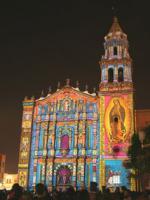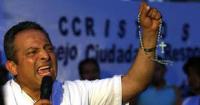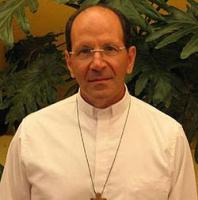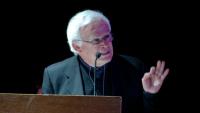
The Pope Finally Does His Job. "Christian" Conservatives Aghast
In Mexico: Priests Fill the Political Void on the Left; Call for Constituent Assembly
"New Politics" - http://newpol.org/content/mexico-priests-fill-political-void-left-call-constituent-assembly
Dan La Botz, February 18, 2015 |

With the left by and large failing to provide political leadership in the critical political situation that has developed in Mexico following the kidnapping of 43 students in Iguala, Guerrero and the “white house” scandal surrounding President Enrique Peña Nieto, Catholic priests have been attempting to fill the void. Several Catholic priests—Padre Gregorio (Goyo) López, Padre Alejandro Solalinde Guerra, and Archbishop Raúl Vera most prominent among them—have in different ways been playing the role of spokespersons for the oppressed. These priests have been speaking out against government corruption and the politicians’ links to the drug cartels, defending local armed self-defense organizations, demanding an investigation into the role of the Mexican Army, and even calling for a constituent assembly to refound the country on a new and more democratic basis.
The Catholic Church was from the 1500s to the mid-twentieth century among the most reactionary forces in Mexico, always allied with the landlords and the government. There were famous exceptions, such as Father Miguel Hidalgo y Castillo and Father José Manuel Morelos y Robles, both of whom led the radical wing of the Mexican Independence movement of the early 1800s, still by and large the Church and the priests were arch-reactionaries. But after John XXIII called the Second Vatican Council in the mid-1960s, some Mexican prelates and priests moved to the left, embracing not only church reform but also the Theology of Liberation. Today one finds Bishop Raúl Vera calling for overturning and replacing the Mexican government with a new democratic government to be built from the grassroots up.

One might expect such demands to come from the left—and sometimes one does—but the largest left party, National Regeneration Movement (MORENA), led by Andrés Manuel López Obrador, is focused on winning elections and raising him to the presidency in 2018, and while it has criticized presidential corruption in the “white house” affair, has not attempted to lead the most recent wave of protests over the killing and kidnapping of the Ayotzinapa Teachers College Students on September 26. Though small left political parties, clandestine guerrilla groups, and armed self-defense forces appear to abound in Mexico, none of them has the credibility or the mass following to put itself forward as the leader in the current prolonged political crisis. The National Coordinating Committee (la CNTE) of the Mexican Teachers Union (el SNTE), strong in the southern and western states, has played some role in organizing a mass opposition to government policies, but it is not a political party capable of putting forward a genuine political alternative. Many Mexicans, especially young people, don’t believe in Congress, don’t believe in the election authorities, simply do not trust any political party. So, now the Catholic Church has taken up the task of social and political criticism as well as the proposal of alternatives.
Padre Goyo

Each of the Catholic priests who have taken on the role of defender of the people has his own political roles and has carved out his own political space. The nearly 50-year old Padre Gregorio López, better known as Padre Goyo, heads a parish in Apatzingán, Michoacán, a territory controlled by the Knights Templar drug cartel. (He is not to be confused with another Padre Padre Goyo, Gregorio López Gorostieta, who was found murdered, presumably by one of the cartels in the town of Tlapehuala, Guerrero on December 26, 2014.) Padre Goyo, who at home wears both a clerical collar and a bullet proof vest, has become famous in Mexico for fingering drug cartel figures to the Mexican police, among them the mayor of Apatzingán who was subsequently removed from office. An erstwhile defender of the region’s armed self-defense organizations and of their most prominent leader, Dr. José Manuel Mireles Valverde the community of Tepalcatepec, Goyo also criticizes other self-defense organizations that he believes are fronts for the cartels.
Goyo has also created the Citizens Council Responsible for Promoting a Healthy Fabric of the Social Order or CCRISTOS, made up of local businesspeople and professionals; with that group and the Federal Police has carried out raids on Knights Templar center in Apatzingán. His method had been to organize the middle class and to seek an alliance with the government and the police authorities. His flamboyant behavior and outspoken manner led the Church to send him to Rome where he is supposed to have met with the Pope who reportedly set limits to his activities, though he continues to be kept at arm’s length by Mexican church authorities.
Padre Goyo recently traveled to the United States speaking in Mexican communities from Los Angeles to Chicago to New York. When I heard him speak in Queens, a tireless if sometimes rambling speaker whose discourse was filled with anecdotes about the drug lords’ many murder victims and tales of his own struggle for justice; he lashed out against the cartels, promoted his own strategy of organizing middle class reform organizations such as CCRISTOS, and insisted that people had to demand that the political authorities and the police do their job and end corruption. He denied that he had sold out the movement or Dr. Mireles while meeting with the Mexican Minster of the Interior, presenting himself as a necessary broker between society and government. Goyo ended his talk be explaining that he was heading off to South America to speak with prominent leaders, seeking to join forces with others fighting against such violence.
Padre Solalinde

Altogether different is Padre Alejanro Solalinde, a 69-year old priest with a calm manner who runs the Brothers on the Road migrant shelter in Ixtepec, Oaxaca, and who has become a leading human rights spokesperson in the last few years. While still a seminarian in the Carmelite order, Solinde and a group of fellow students left the order over ideological differences and disappointment in their education. Solalinde went off to earn bachelor’s degrees in history and another psychology as well as a master’s in family therapy at the Ecclesiastical Studies Institute of Higher Learning. He subsequently spent 30 years as a parish priest before being asked by the Mexican Bishops’ Council to undertake work as the pastor for migrants in the southern states of Chiapas, Oaxaca, and Guerrero. Now a monsignor, he has been awarded the prize for Peace and Democracy and the Pagés Llergo prize for Democracy and Human Rights. He left Mexico in 2012 because of death threats, but subsequently returned to continue his work.
Thoroughly disgusted with the Mexican authorities, Padre Solalinde recently said, “Peña Nieto, you should know that your government has reached the point that it is only a question of time, before we carry out a peaceful change, we are going to do what you and the three levels of government—and especially the legislators who represent no one—have failed to do.” In the struggle for peaceful change in Mexico, Monsignor Solalinde has been cooperating with Bishop Raúl Vera López in working to bring about a Citizens Constituent Assembly.
Bishop Raúl Vera López

Bishop Raúl Vera López, today organizing to replace the Mexican government with a better one, has had a distinguished career. Born in 1945, he studied chemistry at the National Autonomous University of Mexico (UNAM) and after graduating in 1968 went off to join the Dominican order, taking his vows in León, Guanajuato in November 1969. From there he went to Bologna, Italy to study theology, later graduating summa cum laude with a degree in theology from the Pontifical University of Saint Thomas Aquinas in Rome. He was ordained in the priesthood in June of 1975 by Pope Paul VI. He served in the most important leadership councils of the Dominican order in Mexico until he was named bishop by John Paul II, serving for a while as auxiliary bishop to Bishop Samuel Ruiz García in Chiapas during the Mexican government’s peace talks with the Zapatista Army of National Liberation (EZLN) in 1995.
In 2000 he became the Bishop of the city of Saltillo in the State of Coahuila on the U.S.-Mexican border where he put much of his emphasis on human rights work. He has spoken out frequently on the situation of the state’s miners, as well as that of other workers, and established the Border with Justice project to deal with the many human rights issues on the Coahuila-Texas border. He also established the Fray Juan de Larios Human Rights Center to monitor and to denounce human rights problems in the region. He has won many awards for his work and was nominated for the Nobel Peace Prize in 2012. Now he has taken on the struggle to create a new government in Mexico.
Vera has called for a Citizens Constituent Assembly. A constituent congress is the term used for a national representative assembly that undertakes to create a new government and to write a new constitution. The two most famous such assemblies, also called constituent congresses or constitutional conventions, were the American Federal Constitutional Convention of 1787 following the War of Independence and the National Constituent Assembly of France created at the time of the revolution of 1789. Mexico has had several constitutions and governments created over the years, the most recent adopted in 1917 in the midst of the Mexican Revolution of 1910 to 1920. While that constitution was in many respects one of the most democratic in the world at the time—at least in theory—the government that it established evolved into an authoritarian one-party state, the rule of the Institutional Revolutionary Party (PRI) that held power from 1928 to 2000, followed by a brief conservative government interregnum and the a return to the rule of the PRI, which is where we are today. At the time of the Chiapas Rebellion of January 1, 1994, the EZLN also called for a constituent assembly and in August of that year held a so-called National Democratic Convention in the jungle, though it was neither really a convention or democratic. While left parties have also suggested a constituent assembly, none of them has the authority of Bishop Vera whose recent call has eclipsed the proposals of the far left.
Taking advantage of the February 5 anniversary of the adoption of the Mexican Constitution of 1917, Vera and his supporters, many of them leading advocates of human rights in Mexico, presented their Citizens’ and Peoples’ Constituent Assembly project to the public. Speaking at the Fray Angélico University Cultural Center near the UNAM in Mexico City, Vera argued that the country’s executive, legislative, and judicial branches had “usurped power,” and he called upon the Mexican people to organize and take it back. The group also published a manifesto (see translation below), together with a similar effort called the National Popular Convention, declaring that they were not any sort of political vanguard but rather that it, “It will be the people of Mexico who together, free and conscious, will achieve the transformation of our country.”
Joint Declaration of the Citizens’ an Peoples’ Constituent Assembly – Ayotzinapa
To the People of Mexico
To the Brother and Sister Peoples of the World
To the National and International Media
February 5, 2015 – The dismantling of the country, of the indigenous territories, the destruction of social rights, the curtailment of individual guarantees, and electoral frauds are aspects of the generalized violence exercised against the population, whose cruelest expression is the forced disappearance, torture, and imprisonment of people involved in social struggle. State terrorism imposes itself like a permanent martial law in order to achieve the final sacking of our natural resources in order to sustain the decadence of the most powerful and salvage empire that humanity has known. This violence has turned Mexico into a common grave. While plans for our dispossession and occupation grow and the state announces the generalization of its violence against the population, new and old actors go out into the streets today in massive numbers, moved by the crime of Ayotzinapa, shaking the foundations of a regime that seemed impotent. They unleash hope and put in the center of the struggle the call for justice and a radical questioning of the antinational regime.
Today the National Popular Convention and the Citizens’ and Peoples’ Constituent Assembly come into the public light, like two streams of the same great river that is the Mexican people in search of a peaceful, popular and civic solution to the crisis as it advances toward the refoundation of Mexico. We recognize both initiatives as part of the process through wich our peoples construct spaces of reflection, analysis, resistance, and common action, and through which they can express all of their voices, wisdom, experiences, spiritualities, and the powerful root of our culture. Both spaces, in addition to our joining in the call for the appearance alive of the 43 Ayotzinapa Teachers College Students, put us in the center of the need for national unity.
For this reason, we declare that we are walking on parallel, not opposing paths. The objectives of each project lead us to dialogue. In the following days we will continue strengthening the bridges of dialogue, communication, mutual understanding, and action to contribute to liberation from this shameful and unjust neoliberal system.
We affirm that we are not the vanguard, but rather people making humble efforts to bring together a part of the dissidence that had led to the oppression which this government of lackeys of the transnational, oligarchic capitalist class imposes on us, and for that reason we require dialogue to come together, to speak with different references, but above all those of the unorganized men and women in our citizenry. It will be the peoples of Mexico who together, free and conscious will achieve the transformation of our country.
Because they were taken from us alive, we want them back alive!
The people united, will never be defeated!
Long live the unity of the Mexican people.
Translation of Declaration by Dan La Botz
No comments:
Post a Comment